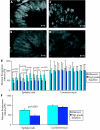Telomere shortening of epithelial cells characterises the adenoma-carcinoma transition of human colorectal cancer
- PMID: 12912862
- PMCID: PMC1773793
- DOI: 10.1136/gut.52.9.1304
Telomere shortening of epithelial cells characterises the adenoma-carcinoma transition of human colorectal cancer
Abstract
Background: and aims: Chromosomal instability is one of the most consistent markers of sporadic colorectal cancer in humans. There is growing evidence that telomere shortening is one of the mechanisms leading to chromosomal instability and cancer initiation.
Methods: To test this hypothesis, the telomere length of colorectal epithelial cells and cells from connective tissue was determined at the adenoma-carcinoma transition at the cellular level by quantitative fluorescence in situ hybridisation.
Results: Our study showed that the telomere fluorescence intensity of epithelial cells was significantly weaker at the earliest morphologically definable stage of carcinoma-high grade dysplasia with minimal invasive growth-compared with the surrounding adenoma. In contrast, cells from connective tissue had a similar telomere signal intensity at the carcinoma stage compared with the adenoma, and in turn cells from connective tissue had overall significantly stronger telomere fluorescence signals compared with epithelial cells.
Conclusions: These results demonstrate that short telomeres of epithelial cells characterise the adenoma-carcinoma transition during human colorectal carcinogenesis, suggesting that carcinomas arise from cells with critical short telomeres within the adenoma. Since the adenoma-carcinoma transition in colorectal cancer is characterised by an increase in chromosomal instability and anaphase bridges, our data support the hypothesis that short telomeres initiate colorectal cancer by induction of chromosomal instability.
Figures


References
-
- Vogelstein B, Fearon ER, Hamilton SR, et al. Genetic alterations during colorectal-tumor development. N Engl J Med 1988;319:525–32. - PubMed
-
- Lengauer C, Kinzler KW, Vogelstein B. Genetic instabilities in human cancers. Nature 1998;396:643–9. - PubMed
-
- Parsons R, Li GM, Longley MJ, et al. Hypermutability and mismatch repair deficiency in RER+ tumor cells. Cell 1993;17:1227–36. - PubMed
-
- Honchel R, Halling KC, Schaid DJ, et al. Microsatellite instability in Muir-Torre syndrome. Cancer Res 1994; 54:1159–63. - PubMed
-
- Young J, Leggett B, Gustafson C, et al. Genomic instability occurs in colorectal carcinomas but not in adenomas. Hum Mutat 1993;2:351–4. - PubMed
MeSH terms
Substances
LinkOut - more resources
Full Text Sources
Medical
